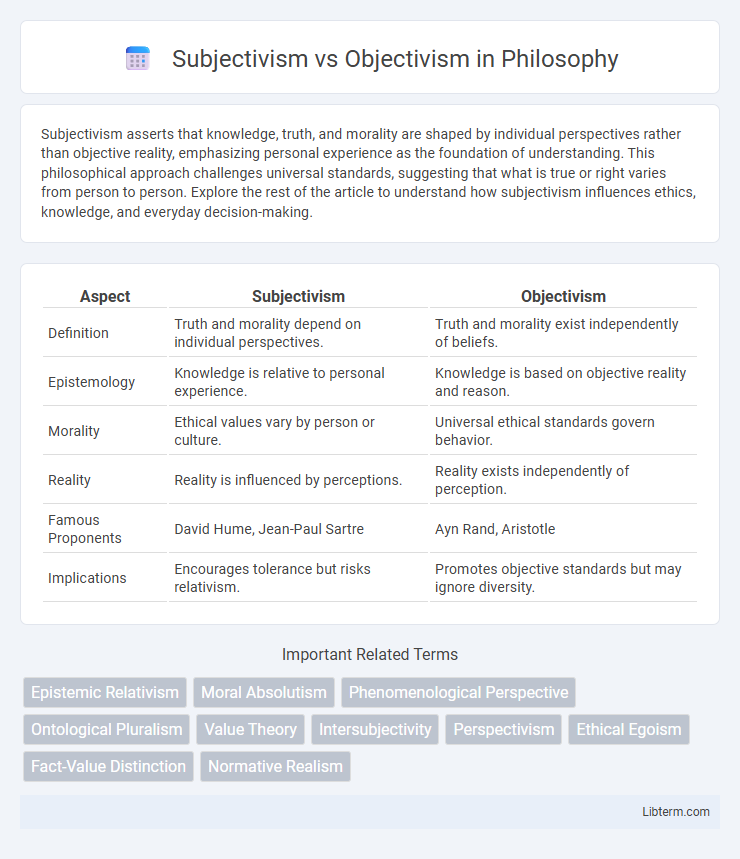Subjectivism asserts that knowledge, truth, and morality are shaped by individual perspectives rather than objective reality, emphasizing personal experience as the foundation of understanding. This philosophical approach challenges universal standards, suggesting that what is true or right varies from person to person. Explore the rest of the article to understand how subjectivism influences ethics, knowledge, and everyday decision-making.
Table of Comparison
| Aspect | Subjectivism | Objectivism |
|---|---|---|
| Definition | Truth and morality depend on individual perspectives. | Truth and morality exist independently of beliefs. |
| Epistemology | Knowledge is relative to personal experience. | Knowledge is based on objective reality and reason. |
| Morality | Ethical values vary by person or culture. | Universal ethical standards govern behavior. |
| Reality | Reality is influenced by perceptions. | Reality exists independently of perception. |
| Famous Proponents | David Hume, Jean-Paul Sartre | Ayn Rand, Aristotle |
| Implications | Encourages tolerance but risks relativism. | Promotes objective standards but may ignore diversity. |
Introduction to Subjectivism and Objectivism
Subjectivism emphasizes personal perspectives, feelings, and opinions as the foundation of truth and knowledge, asserting that reality is shaped by individual experiences. Objectivism, in contrast, holds that reality and truths exist independently of human thoughts or beliefs, relying on objective facts and logic. Understanding these philosophical positions reveals contrasting views on knowledge, ethics, and the nature of reality.
Defining Subjectivism: Core Principles
Subjectivism centers on the belief that knowledge and truth are fundamentally shaped by individual perspectives, emotions, and experiences, making them inherently personal. Core principles emphasize that reality is mentally constructed, and ethical values depend on personal feelings rather than external standards. This philosophy contrasts sharply with Objectivism, which asserts that truth and morality exist independently of human perception.
Understanding Objectivism: Foundational Concepts
Objectivism, founded by Ayn Rand, emphasizes reality as an objective absolute independent of perception or beliefs. It upholds reason as the only means of acquiring knowledge and promotes rational self-interest as the ethical foundation of human action. Key concepts include metaphysical realism, epistemological rationalism, and ethical egoism, asserting that reality exists as an absolute factual state and individuals must pursue their happiness through reason.
Historical Background and Philosophical Roots
Subjectivism traces its roots to ancient Greek Skepticism and later gained prominence through 17th-century philosophers like Rene Descartes and David Hume, who emphasized individual perception and doubt as central to knowledge. Objectivism, influenced by Aristotle's emphasis on objective reality and later formalized by Ayn Rand in the 20th century, asserts that reality exists independently of consciousness and can be understood through reason. The historical tension between these philosophies reflects ongoing debates about the nature of truth, knowledge, and reality in epistemology and metaphysics.
Key Differences Between Subjectivism and Objectivism
Subjectivism asserts that knowledge and truth are dependent on individual perceptions and personal experiences, emphasizing the role of consciousness in shaping reality. Objectivism maintains that reality exists independently of human thoughts or beliefs, advocating for objective truths that are universal and discoverable through reason and empirical evidence. Key differences include subjectivism's reliance on internal subjective states versus objectivism's commitment to external, measurable facts.
Subjectivism in Ethics and Morality
Subjectivism in ethics asserts that moral judgments are based on individual feelings, preferences, or opinions rather than universal truths or objective standards. This perspective emphasizes that what is considered right or wrong varies from person to person, reflecting personal experiences and cultural influences. Ethical subjectivism challenges the existence of absolute moral principles by prioritizing subjective states as the foundation of moral value.
Objectivism’s Approach to Truth and Reality
Objectivism asserts that reality exists independently of consciousness, emphasizing an objective truth accessible through reason and evidence. According to Objectivist philosophy, facts are absolute and remain consistent regardless of individual beliefs or perceptions. This approach prioritizes logic and empirical data as the foundation for understanding reality and establishing knowledge.
Influence in Science, Art, and Society
Subjectivism emphasizes personal perspectives and emotions, influencing art by encouraging individual expression and creativity, while objectivism stresses unbiased facts and universal truths, driving scientific methods and empirical research. In science, objectivism fosters reproducibility and objective measurement, ensuring reliable knowledge, whereas subjectivism highlights the role of interpretation and context in understanding phenomena. Society grapples with these philosophies as objectivism promotes universal ethics and laws, while subjectivism advocates for cultural relativism and personal freedom.
Common Criticisms of Both Philosophies
Subjectivism faces criticism for its potential to lead to moral relativism, where ethical standards vary too widely and lack universal applicability. Objectivism is often challenged for its rigid adherence to absolute truths, which can ignore cultural diversity and contextual nuances in moral reasoning. Both philosophies grapple with balancing individual perspective and universal principles, leading to debates on the feasibility of consistent ethical frameworks.
Practical Implications and Modern Perspectives
Subjectivism emphasizes personal experience and individual perception as the basis of truth and morality, impacting decision-making processes by prioritizing emotional and contextual factors. Objectivism advocates for universal truths and objective reality, promoting consistent ethical standards and policies based on empirical evidence. Modern perspectives often blend both views, utilizing cognitive science and behavioral economics to understand how subjective judgments interact with objective data in practical scenarios.
Subjectivism Infographic

 libterm.com
libterm.com